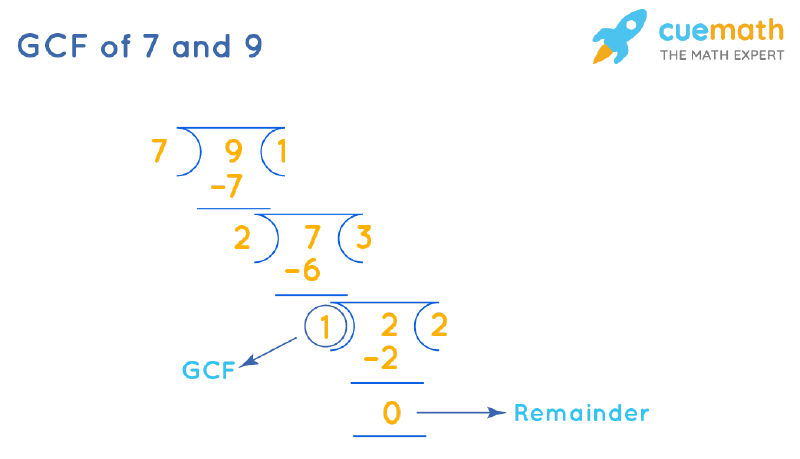GCF of 7 and 9
GCF of 7 and 9 is the largest possible number that divides 7 and 9 exactly without any remainder. The factors of 7 and 9 are 1, 7 and 1, 3, 9 respectively. There are 3 commonly used methods to find the GCF of 7 and 9 - Euclidean algorithm, prime factorization, and long division.
| 1. | GCF of 7 and 9 |
| 2. | List of Methods |
| 3. | Solved Examples |
| 4. | FAQs |
What is GCF of 7 and 9?
Answer: GCF of 7 and 9 is 1.

Explanation:
The GCF of two non-zero integers, x(7) and y(9), is the greatest positive integer m(1) that divides both x(7) and y(9) without any remainder.
Methods to Find GCF of 7 and 9
The methods to find the GCF of 7 and 9 are explained below.
- Prime Factorization Method
- Listing Common Factors
- Long Division Method
GCF of 7 and 9 by Prime Factorization
Prime factorization of 7 and 9 is (7) and (3 × 3) respectively. As visible, there are no common prime factors between 7 and 9, i.e. they are coprime. Hence, the GCF of 7 and 9 will be 1.
GCF of 7 and 9 by Listing Common Factors
- Factors of 7: 1, 7
- Factors of 9: 1, 3, 9
Since, 1 is the only common factor between 7 and 9. The Greatest Common Factor of 7 and 9 is 1.
GCF of 7 and 9 by Long Division

GCF of 7 and 9 is the divisor that we get when the remainder becomes 0 after doing long division repeatedly.
- Step 1: Divide 9 (larger number) by 7 (smaller number).
- Step 2: Since the remainder ≠ 0, we will divide the divisor of step 1 (7) by the remainder (2).
- Step 3: Repeat this process until the remainder = 0.
The corresponding divisor (1) is the GCF of 7 and 9.
☛ Also Check:
- GCF of 6 and 15 = 3
- GCF of 7 and 56 = 7
- GCF of 36 and 42 = 6
- GCF of 9 and 10 = 1
- GCF of 45 and 105 = 15
- GCF of 52 and 65 = 13
- GCF of 12 and 24 = 12
GCF of 7 and 9 Examples
-
Example 1: Find the greatest number that divides 7 and 9 exactly.
Solution:
The greatest number that divides 7 and 9 exactly is their greatest common factor, i.e. GCF of 7 and 9.
⇒ Factors of 7 and 9:- Factors of 7 = 1, 7
- Factors of 9 = 1, 3, 9
Therefore, the GCF of 7 and 9 is 1.
-
Example 2: The product of two numbers is 63. If their GCF is 1, what is their LCM?
Solution:
Given: GCF = 1 and product of numbers = 63
∵ LCM × GCF = product of numbers
⇒ LCM = Product/GCF = 63/1
Therefore, the LCM is 63. -
Example 3: Find the GCF of 7 and 9, if their LCM is 63.
Solution:
∵ LCM × GCF = 7 × 9
⇒ GCF(7, 9) = (7 × 9)/63 = 1
Therefore, the greatest common factor of 7 and 9 is 1.

FAQs on GCF of 7 and 9
What is the GCF of 7 and 9?
The GCF of 7 and 9 is 1. To calculate the GCF of 7 and 9, we need to factor each number (factors of 7 = 1, 7; factors of 9 = 1, 3, 9) and choose the greatest factor that exactly divides both 7 and 9, i.e., 1.
What are the Methods to Find GCF of 7 and 9?
There are three commonly used methods to find the GCF of 7 and 9.
- By Long Division
- By Euclidean Algorithm
- By Prime Factorization
What is the Relation Between LCM and GCF of 7, 9?
The following equation can be used to express the relation between Least Common Multiple and GCF of 7 and 9, i.e. GCF × LCM = 7 × 9.
How to Find the GCF of 7 and 9 by Prime Factorization?
To find the GCF of 7 and 9, we will find the prime factorization of the given numbers, i.e. 7 = 7; 9 = 3 × 3.
⇒ There is no common prime factor for 7 and 9. Hence, GCF (7, 9) = 1.
☛ Prime Number
If the GCF of 9 and 7 is 1, Find its LCM.
GCF(9, 7) × LCM(9, 7) = 9 × 7
Since the GCF of 9 and 7 = 1
⇒ 1 × LCM(9, 7) = 63
Therefore, LCM = 63
☛ GCF Calculator
How to Find the GCF of 7 and 9 by Long Division Method?
To find the GCF of 7, 9 using long division method, 9 is divided by 7. The corresponding divisor (1) when remainder equals 0 is taken as GCF.
visual curriculum